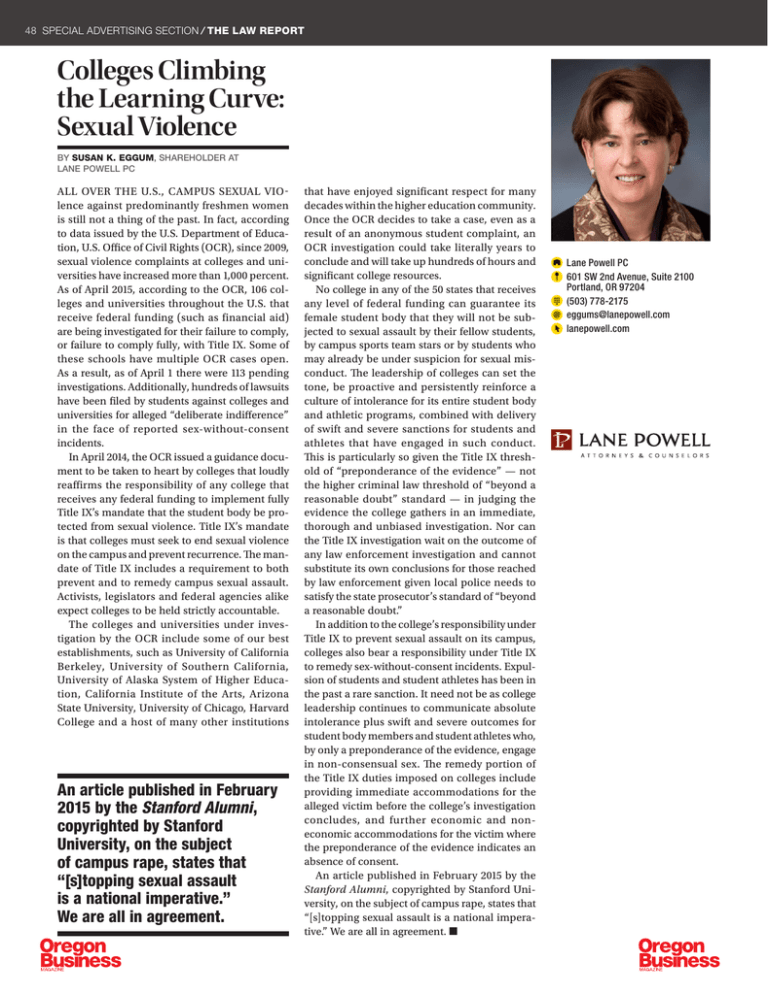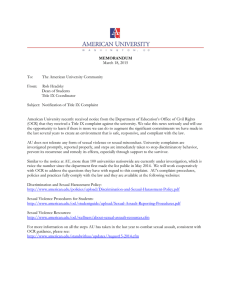Colleges Climbing the Learning Curve: Sexual Violence
advertisement

48 SPECIAL ADVERTISING SECTION ⁄ THE LAW REPORT Colleges Climbing the Learning Curve: Sexual Violence BY SUSAN K. EGGUM, SHAREHOLDER AT LANE POWELL PC ALL OVER THE U.S., CAMPUS SEXUAL VIOlence against predominantly freshmen women is still not a thing of the past. In fact, according to data issued by the U.S. Department of Education, U.S. Office of Civil Rights (OCR), since 2009, sexual violence complaints at colleges and universities have increased more than 1,000 percent. As of April 2015, according to the OCR, 106 colleges and universities throughout the U.S. that receive federal funding (such as financial aid) are being investigated for their failure to comply, or failure to comply fully, with Title IX. Some of these schools have multiple OCR cases open. As a result, as of April 1 there were 113 pending investigations. Additionally, hundreds of lawsuits have been filed by students against colleges and universities for alleged “deliberate indifference” in the face of reported sex-without-consent incidents. In April 2014, the OCR issued a guidance document to be taken to heart by colleges that loudly reaffirms the responsibility of any college that receives any federal funding to implement fully Title IX’s mandate that the student body be protected from sexual violence. Title IX’s mandate is that colleges must seek to end sexual violence on the campus and prevent recurrence. The mandate of Title IX includes a requirement to both prevent and to remedy campus sexual assault. Activists, legislators and federal agencies alike expect colleges to be held strictly accountable. The colleges and universities under investigation by the OCR include some of our best establishments, such as University of California Berkeley, University of Southern California, University of Alaska System of Higher Education, California Institute of the Arts, Arizona State University, University of Chicago, Harvard College and a host of many other institutions An article published in February 2015 by the Stanford Alumni, copyrighted by Stanford University, on the subject of campus rape, states that “[s]topping sexual assault is a national imperative.” We are all in agreement. that have enjoyed significant respect for many decades within the higher education community. Once the OCR decides to take a case, even as a result of an anonymous student complaint, an OCR investigation could take literally years to conclude and will take up hundreds of hours and significant college resources. No college in any of the 50 states that receives any level of federal funding can guarantee its female student body that they will not be subjected to sexual assault by their fellow students, by campus sports team stars or by students who may already be under suspicion for sexual misconduct. The leadership of colleges can set the tone, be proactive and persistently reinforce a culture of intolerance for its entire student body and athletic programs, combined with delivery of swift and severe sanctions for students and athletes that have engaged in such conduct. This is particularly so given the Title IX threshold of “preponderance of the evidence” — not the higher criminal law threshold of “beyond a reasonable doubt” standard — in judging the evidence the college gathers in an immediate, thorough and unbiased investigation. Nor can the Title IX investigation wait on the outcome of any law enforcement investigation and cannot substitute its own conclusions for those reached by law enforcement given local police needs to satisfy the state prosecutor’s standard of “beyond a reasonable doubt.” In addition to the college’s responsibility under Title IX to prevent sexual assault on its campus, colleges also bear a responsibility under Title IX to remedy sex-without-consent incidents. Expulsion of students and student athletes has been in the past a rare sanction. It need not be as college leadership continues to communicate absolute intolerance plus swift and severe outcomes for student body members and student athletes who, by only a preponderance of the evidence, engage in non-consensual sex. The remedy portion of the Title IX duties imposed on colleges include providing immediate accommodations for the alleged victim before the college’s investigation concludes, and further economic and noneconomic accommodations for the victim where the preponderance of the evidence indicates an absence of consent. An article published in February 2015 by the Stanford Alumni, copyrighted by Stanford University, on the subject of campus rape, states that “[s]topping sexual assault is a national imperative.” We are all in agreement. n Lane Powell PC 601 SW 2nd Avenue, Suite 2100 Portland, OR 97204 (503) 778-2175 eggums@lanepowell.com lanepowell.com

